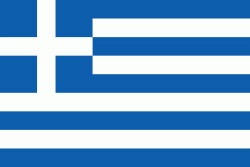Dodecanese
Rhodes has been the area's dominant island since antiquity. Of the others, Kos and Patmos are historically the more important; the remaining twelve are Agathonisi, Astypalaia, Halki, Kalymnos, Karpathos, Kasos, Leipsoi, Leros, Nisyros, Symi, Tilos, and Kastellorizo. Other islands in the chain include Alimia, Arkoi, Farmakonisi, Gyali, Kinaros, Levitha, Marathos, Nimos, Pserimos, Saria, Strongyli and Syrna.
The name "Dodecanese" (older form ἡ Δωδεκάνησος, hē Dōdekanēsos; modern τα Δωδεκάνησα, ta Dōdekanēsa), meaning "The Twelve Islands", or Oniki Adalar in Turkish, denotes today an island group in the southeastern Aegean Sea, comprising fifteen major islands (Agathonisi, Astypalaia, Chalki, Kalymnos, Karpathos, Kasos, Kastellorizo, Kos, Lipsi, Leros, Nisyros, Patmos, Rhodes, Symi, and Tilos) and 93 smaller islets. Since Antiquity, these islands formed part of the group known as the "Southern Sporades" (Νότιες Σποράδες).
The name Dōdekanēsos first appears in Byzantine sources in the 8th century, as a naval command under a droungarios, encompassing the southern Aegean Sea, which eventually evolved into the Theme of Samos. However it was not applied to the current island group, but to the twelve Cyclades islands clustered around Delos. The name may indeed be of far earlier date, and modern historians suggest that the 12 islands mentioned by Strabo (Geographica Χ.485) was the origin of the term. The term remained in use throughout the medieval period and was still used for the Cyclades in both colloquial usage and scholarly Greek-language literature until the 18th century.
The transfer of the name to the present-day Dodecanese has its roots in the Ottoman period. Following the Ottoman conquest in 1522, the two larger islands, Rhodes and Kos, came under direct Ottoman rule, while the others, of which the twelve main islands were usually named, enjoyed extensive privileges pertaining to taxation and self-government. Concerted attempts to abolish these privileges were made after 1869, as the Ottoman Empire attempted to modernize and centralize its administrative structure, and the last vestiges of the old privileges were finally abolished after the Young Turks took power in 1908. It was at that time that the press in the independent Kingdom of Greece began referring to the twelve privileged islands (Astypalaia, Chalki, Ikaria, Kalymnos, Karpathos, Kasos, Kastellorizo, Leros, Nisyros, Patmos, Symi, Tilos), in the context of their attempts to preserve their privileges, collectively as the "Dodecanese". Shortly after, in 1912, most of the Southern Sporades were captured by the Italians in the Italo-Turkish War, except for Ikaria, which joined Greece in 1912 during the First Balkan War, and Kastellorizo, which came under Italian rule only in 1921. The place of the latter two was taken by Kos and Rhodes, bringing the number of the major islands under Italian rule back to twelve. Thus, when the Greek press began agitating for the cession of the islands to Greece in 1913, the term used was still the "Dodecanese". The Italian occupation authorities helped to establish the term when they named the islands under their control "Rhodes and the Dodecanese" (Rodi e Dodecaneso), adding Leipsoi to the list of the major islands to make up for considering Rhodes separately.
By 1920, the name had become firmly established for the entire island group, a fact acknowledged by the Italian government when it appointed the islands' first civilian governor, Count Carlo Senni, as "Viceroy of the Dodecanese". As the name was associated with Greek irredentism, from 1924 Mussolini's Fascist regime tried to abolish its use by referring to them as the "Italian Islands of the Aegean", but this name never acquired any wider currency outside Italian administrative usage. The islands joined Greece in 1947 following as the "Governorate-General of the Dodecanese" (Γενική Διοίκησις Δωδεκανήσου), since 1955 the "Dodecanese Prefecture" (Νομός Δωδεκανήσου).
Map - Dodecanese
Map
Country - Greece
 |
 |
| Flag of Greece | |
Greece is considered the cradle of Western civilization, being the birthplace of democracy, Western philosophy, Western literature, historiography, political science, major scientific and mathematical principles, theatre and the Olympic Games. From the eighth century BC, the Greeks were organised into various independent city-states, known as poleis (singular polis), which spanned the Mediterranean and the Black Sea. Philip II of Macedon united most of present-day Greece in the fourth century BC, with his son Alexander the Great rapidly conquering much of the ancient world, from the eastern Mediterranean to the North Western parts of India. The subsequent Hellenistic period saw the height of Greek culture and influence in antiquity. Greece was annexed by Rome in the second century BC, becoming an integral part of the Roman Empire and its continuation, the Byzantine Empire, which was culturally and linguistically predominantly Greek.
Currency / Language
| ISO | Currency | Symbol | Significant figures |
|---|---|---|---|
| EUR | Euro | € | 2 |
| ISO | Language |
|---|---|
| EN | English language |
| FR | French language |
| EL | Greek language |















